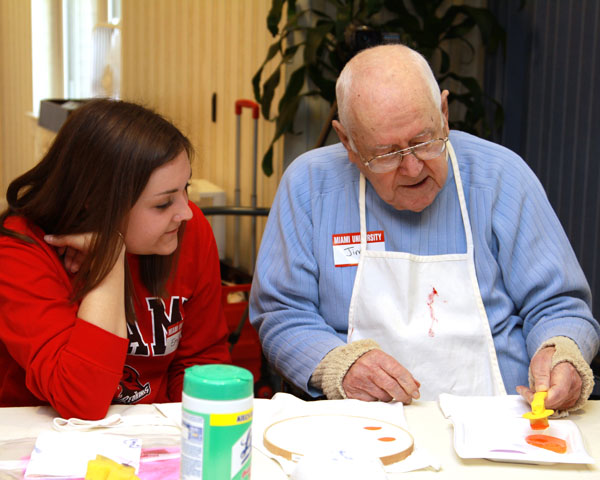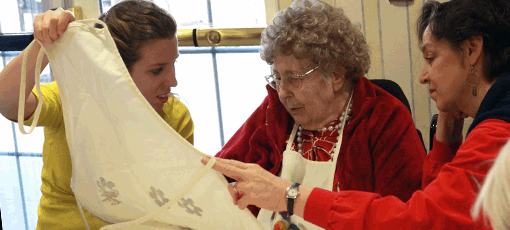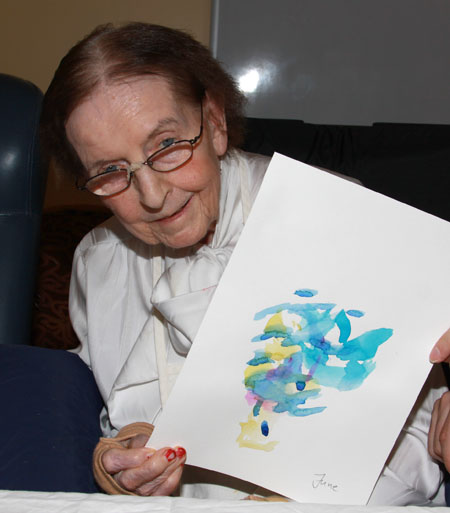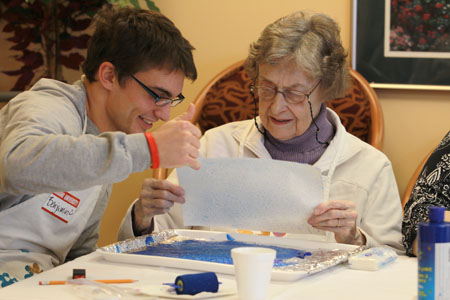Comments from staff and volunteers
"During OMA my residents light up, smile and engage as they participate in the program. Many of these residents do not participate in most programs; some wander aimlessly without regard to their environment. OMA enriched the lives of the residents and volunteers."

- "[I enjoyed] observing the reactions on faces of the residents. Many were pleasantly surprised at their finished work. It improved the quality of their lives by participating in OMA."
"I very much enjoyed seeing people happy with their work and accomplishments and being in charge of their own responses."
- "The most important thing that I learned from participating in the OMA program is that human beings can connect emotionally under any circumstances. Even when all other cognition fails, emotions linger in the mind."
- "I can honestly say I liked EVERYTHING about the OMA experience. The one-on-one interaction with the participants made the experience more
m
 eaningful by permitting emotional connections and naturally encouraging patience. As a bonus, watching the individuals merge as a group was rewarding."
eaningful by permitting emotional connections and naturally encouraging patience. As a bonus, watching the individuals merge as a group was rewarding."
Volunteers transform their fears of people who have dementia to friendship:
-
After the first visit, one student wrote, "My first impressions in the dementia unit were uncomfortable and even a little frightening. I don't like to admit it, but it was a little scary to walk through doors that only open from the inside of the unit with a code and to see very old people struggling to eat eggs and toast for breakfast and hear a raspy female voice off in a side room yelling, 'help me god help me help me..' while everyone else seemed to ignore her."
-
After the fourth visit, the same student wrote, "I almost consider [participant's name deleted] in the same light I might consider my own grandmother. There are differences, of course, and there also isn't a long history like with my actual grandma, but I care about her and have that same pull toward her, just to hold her hand, and to see if she needs anything. That just comes from caring about older people, when you know that your presence is super important to them and you want to make them happy. I was hoping that something like the relationship I have with [participant's name deleted] might come from this, but I didn't think that it would happen so fast, and I wasn't sure that it would happen at all, so I am very grateful."
People learn better ways to communicate with people who have dementia: -
"Before OMA, I talked to them like children. Now, I know the most important thing is to make them feel important and show that their life still means something to someone."

- "It pointed out to me how important it is for an older person to be allowed the time to respond in their own way, not in a way others want them to."
-
"I try to not overwhelm them with too many questions at one time. ...It also has made me realize the importance of wait time, not directing the residents too much and not to talk too much to them while they are focusing."
-
"OMA has taught me to slow down and appreciate more."
Staff members give people with dementia more opportunities to be independent:
- "OMA has helped me see the pride of my residents as they are given the freedom to make choices. OMA has shown me that freedom of choice and expression can unlock even the most confused of minds."
-
"OMA has created a new mindset in our department. The program has validated the necessity of the residents doing things for themselves. OMA provides a new culture that is now used in our department when planning and implementing all activities."

- "I learned from OMA that you do not have to do everything for someone with dementia; they are able to [do things] for themselves if you have the patience with them."
-
Now I am much slower to jump in and do things for my residents."
People with dementia can participate and be creative:
People with dementia can make social connections:

